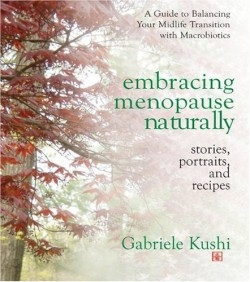Embracing Menopause Naturally
Stories Portraits and Recipes
For women of the Baby Boomer generation now entering midlife, menopause is still very often a misunderstood process. The author seeks to rectify that situation by dispelling some of the myths and fears surrounding it. She suggests a natural approach to menopausal changes centering on macrobiotics, and includes close to forty basic macrobiotic recipes as a start. Twenty interviews with post-menopausal women interspersed between chapters give the book a strong personal dimension.
Kushi, a certified macrobiotic health educator, counselor and cooking teacher, is the daughter-in-law of Michio and Aveline Kushi, founders of Erewhon natural food stores and long-time leaders of the macrobiotic movement in the U.S. She is also a professional photographer and the black and white portraits accompanying the interviews are her own work.
For these interviews, Kushi says, “I chose women from a diversity of cultures to explore universal approaches to menopause.” Many, but not all, practice macrobiotics. Quite a few are Native Americans whose tribal cultures incorporate rituals for women undergoing midlife changes.
Their experiences cover the range of physical, psychological and emotional symptoms reported in medical literature—hot flashes, memory loss, anxiety, sleeplessness and more. Yet most of those who tried conventional therapy eventually dropped it in favor of a stoic, natural approach.
The author makes a strong case for avoiding hormone replacement therapy (HRT), widely prescribed in the 1990s as a way to ease hot flashes and other common symptoms of menopause. Citing studies published in mainstream medical journals, she says those beliefs have recently been overturned, as it became clear that “HRT increased the risk of breast cancer while providing no benefit against heart disease and stroke … and also does not protect against dementia.”
There’s an extensive source list for those interested in pursuing macrobiotics and other alternative health avenues.
But whether or not the macrobiotic diet and lifestyle appeal, women facing midlife changes are likely to find this book useful, both for its clear explanation of menopause and for the testimonies of women who have come through the process. One of the most common recollections among the women interviewed was the fear that menopause meant the end of meaningful life as a woman, the onset of decline. Most affirm that there is, indeed, life after The Change.
“This is a time of freedom from the demands of others,” says one. Others report, “It feels like a birth, or an entry into a new country,” and “Menopause was a time of transformation, physiologically, emotionally, and spiritually.”
To the unprecedented numbers of women now in the throes of what one interviewee said “can feel like a tremendous tornado passing through,” this should be reassuring news.
Reviewed by
Marilyn Bowden
Disclosure: This article is not an endorsement, but a review. The publisher of this book provided free copies of the book to have their book reviewed by a professional reviewer. No fee was paid by the publisher for this review. Foreword Reviews only recommends books that we love. Foreword Magazine, Inc. is disclosing this in accordance with the Federal Trade Commission’s 16 CFR, Part 255.

